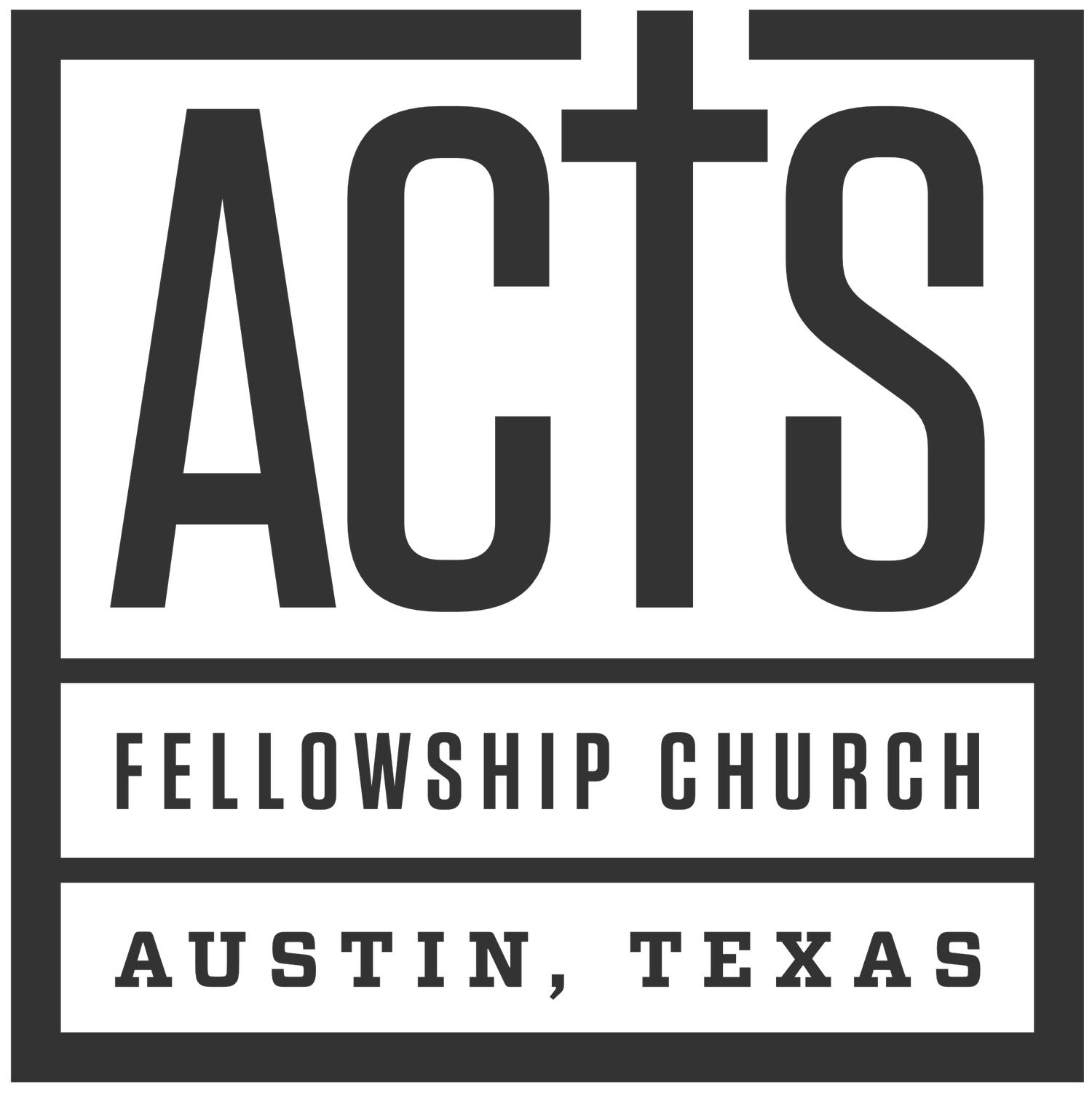
What We Believe
Core Values and Beliefs
Acts Fellowship Church seeks to glorify God through the Three Greats of the Bible:
The Great Commandment, The Great Community, and The Great Commission.
The Great Commandment
At Acts Fellowship Church, we seek to live out the call of Deut. 6:5 to “Love the LORD your God with all your heart and with all your soul and with all your strength.” This is what Christ calls the Greatest Commandment, and it’s from this commandment that the other parts of our vision derive. The goal of all that we do at Acts is always first and foremost to honor God.
For sinners like us, the only hope we have for this to happen is when we believe upon and cling to Jesus Christ, and so we believe the gospel is our central and most important message. Acts exists to live to see this message make progress in the lives of others.
In order to ensure that it is heard and understood, we believe in strong teaching ministries both from the pulpit and in the classroom. We also want to remember that it’s a message worth celebrating and that God, in fact, calls us to express these affections together; so we believe corporate worship is an integral part of our church.
We also know that to love something is a pretty comprehensive activity, and so we operate with the understanding that we want to focus on the inner life of those in our church, not just the way they appear to live on the outside.
The Great Community
We believe God has called his church to be the Great Community, expressing Christ’s love to one another and to the world. Our Lord teaches us in Matt 22:39-40 that loving our neighbors as ourselves is the second greatest charge given to God’s people.
In accordance with Luke 10:25-37 (The Parable of the Good Samaritan), we believe that as a community of Christians, we should be more concerned with loving people than with worrying about the boundaries and limits of our associations. This is something we’re still growing into at our church, but please be with us as we seek to learn what it means to love this world on Christ’s behalf, particularly the poor and suffering in Austin.
We also believe that Christ means for us to demonstrate his love to other believers. We believe part of what it means to be in a church is that we belong to one another, and so we place a high value on membership. Acts is not about creating an elitist club, but rather we believe we have a special responsibility to those who have committed to being a part of our community here. We believe that each member of our body has something important and valuable to do in Christ’s name for us to function well.
Therefore, part of our vision as a Great Community is to provide those in our church with a range of opportunities to serve and be used by God. We also believe that the authority God gives to the church needs to be exercised to protect its members and its message, and our vision is to see church discipline exercised judiciously and wisely to ensure the purity of Christ’s body. Additionally, we are committed to creating a real, living and breathing community that loves living life together, so you’ll see our calendar full of events to promote fellowship and camaraderie.
The Great Commission
The Great Commission (Matt 28:18-20) stems from the second greatest commandment given to the followers of Jesus Christ which is to love our neighbors as ourselves (Matt 22:39). It contains one verb and three participles. The command is “to make disciples” of Jesus Christ as they are “going,” “baptizing,” and “teaching.” The scope of going is to “all the nations.” Baptizing is to be done in the name of the Father, Son, and the Holy Spirit to those who would come to believe. And their teaching is for the hearers to observe everything Jesus taught them.
It is God’s sovereign plan to work in and through His followers in every generation to make Him known to the world. But how will they call on Him in whom they have not believed? How will they believe in Him whom they have not heard? And how will they hear without someone telling them? Therefore, it is our role in God’s plan to be the feet that bring the good news, and the lips that speak the truth. The early church obeyed this commandment in various ways.
The Bible records at least five ways that the gospel was shared:
Personal Evangelism. The earliest Christians faced severe persecution, and as a result, they were forced to flee to their homes. As they scattered across various regions, they took the message of salvation through Jesus Christ with them. This is called “personal evangelism.” Throughout church history, vast majority of the conversions were done through personal evangelism rather than a “churchwide outreach event.” It was one person sharing the gospel with another.
Open air preaching. Both Jesus and Paul often found places where groups of people gathered and sought to preach to them. Some may call this “street witnessing.”
Small Gatherings. Early believers often met together and witnessed in households.
Large Gatherings. Since many early believers were former Jews, that infrastructure for large gatherings became a vital tool for the expansion of the Church.
Missionary journeys
Our church will seek to fulfill the great commandment through 3 primary avenues:
By equipping its members in personal evangelism
By planning for various evangelistic events
By going on mission trips
God
God is the Creator, Provider, and Master of the universe. He has eternally existed in three persons: the Father, the Son and the Holy Spirit. These three are co-equals and are one God.
Genesis 1:1,26,27; 3:22; Psalm 90:2; Matthew 28:19; 1 Peter 1:2; 1 Corinthians 13:14
Man
Human beings are made in the spiritual image of God – to be like Him in character. Human beings are the supreme object of God’s creation. Although an individual has tremendous potential for good, he or she is marred by sin. This sin separates the person from God. No person is without sin.
Genesis 1:27; Psalm 8:3-6; Isaiah 53:6a; Romans 3:23; Isaiah 59:1,2
About Eternity
People were created to exist forever. They will either exist separated from God by sin, or in union with God through forgiveness and salvation.
John 3:16; John 2:25; 1 John 5:11-13; Romans 6:23; Revelation 20:15; Matthew 8:11; Matthew 24:44
Jesus Christ
Jesus Christ is the Son of God. He is co-equal with God the Father. Jesus was born to a virgin Mary and lived a sinless human life. He offered Himself as the perfect sacrifice for the sins of all people by dying on a cross. He, then, arose from the dead after three days to demonstrate His power over sin and death. He ascended to Heaven and will return again one day to earth to take God’s people back with Him.
Matthew 1:22,23; Isaiah 9:6; John 1:1-5, 14:10-30; Hebrews 4:14,15; 1 Corinthians 15:3,4; Romans 1:3,4; Acts 1:9-11; I Timothy 6:14,15; Titus 2:13
Salvation
Salvation is a gift from God to human beings. A person can never make up for his or her sin by self-improvement or good works. Only by trusting in Jesus Christ as God’s offer of forgiveness can a person be saved from sin’s penalty. Eternal life begins the moment one receives Jesus Christ into his life by faith.
Romans 6:23; Ephesians 2:8,9; John 14:6, 1:12; Titus 3:5; Galatians 3:26; Romans 5:1
Eternal Security
Because God gives man eternal life through Christ Jesus, a believer can be assured of his or her salvation. Salvation is maintained by the grace and power of God, not by the self-effort of the Christian. It is the grace and keeping power of God that gives this security. Once genuinely saved, one cannot lose his or her salvation.
John 10:29; II Timothy 1:12; Hebrews 7:25; 10:10,14; I Peter 1:3-5
The Holy Spirit
The Holy Spirit is equal with God the Father and God the Son as God. He is present in the world to make people aware of their need for Jesus Christ. He also lives in every Christian from the moment of salvation. He provides the Christian with the power for living, understanding of spiritual truth, and guidance in doing what is right. The Christian seeks to live under His control daily.
II Corinthians 3:17; John 16:7-13, 14:16,17; Acts 1:8; I Corinthians 2:12, 3:16; Ephesians 1:13; Galatians 5:25; Ephesians 5:1
The Bible
The Bible is God’s word to all people. It was written by human authors, under the supernatural guidance of the Holy Spirit. It is the supreme source of truth for Christian beliefs and living. And because it is inspired by God, it is reliable and trustworthy without any mixture of error in its original text.
II Timothy 3:16; II Peter 1:20,21; II Timothy 1:13; Psalm 119:105,160, 12:6; Proverbs 30:5



